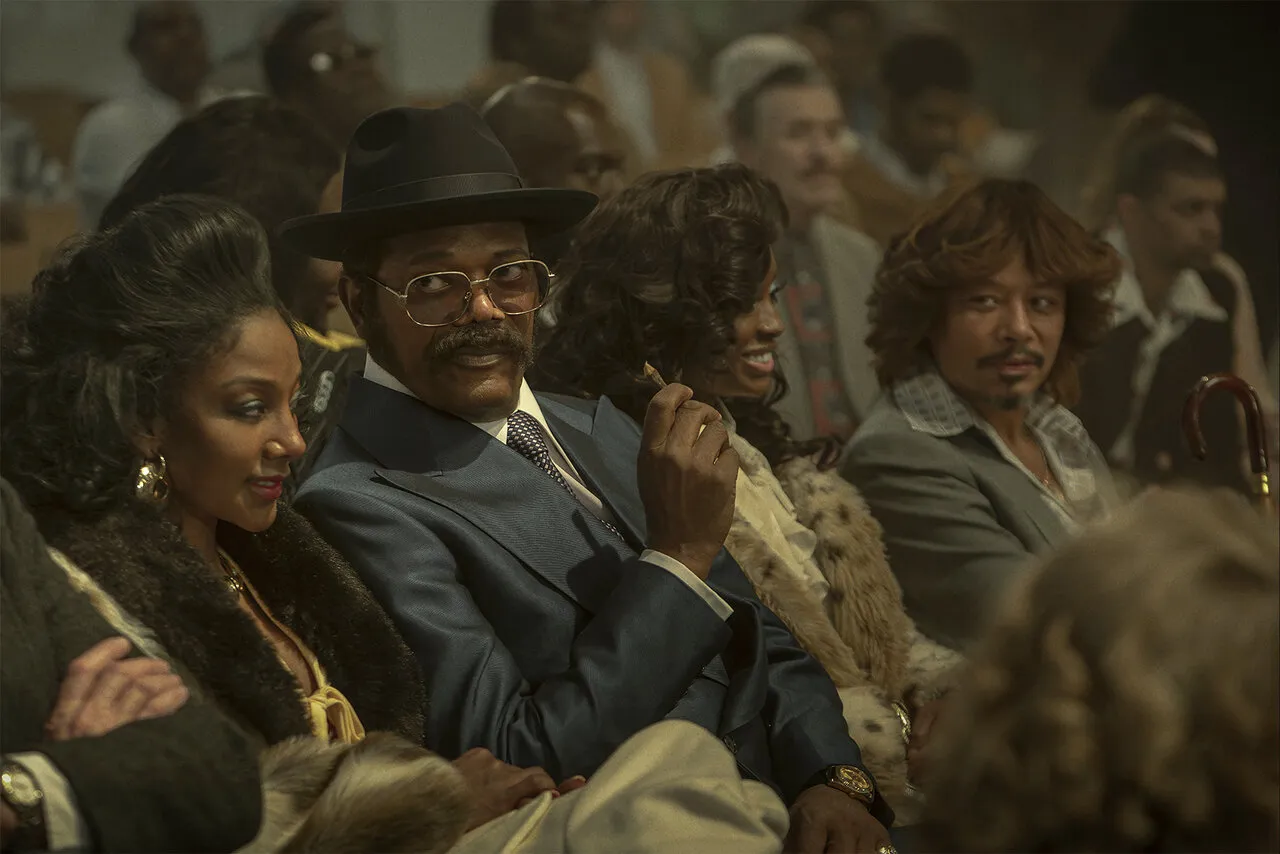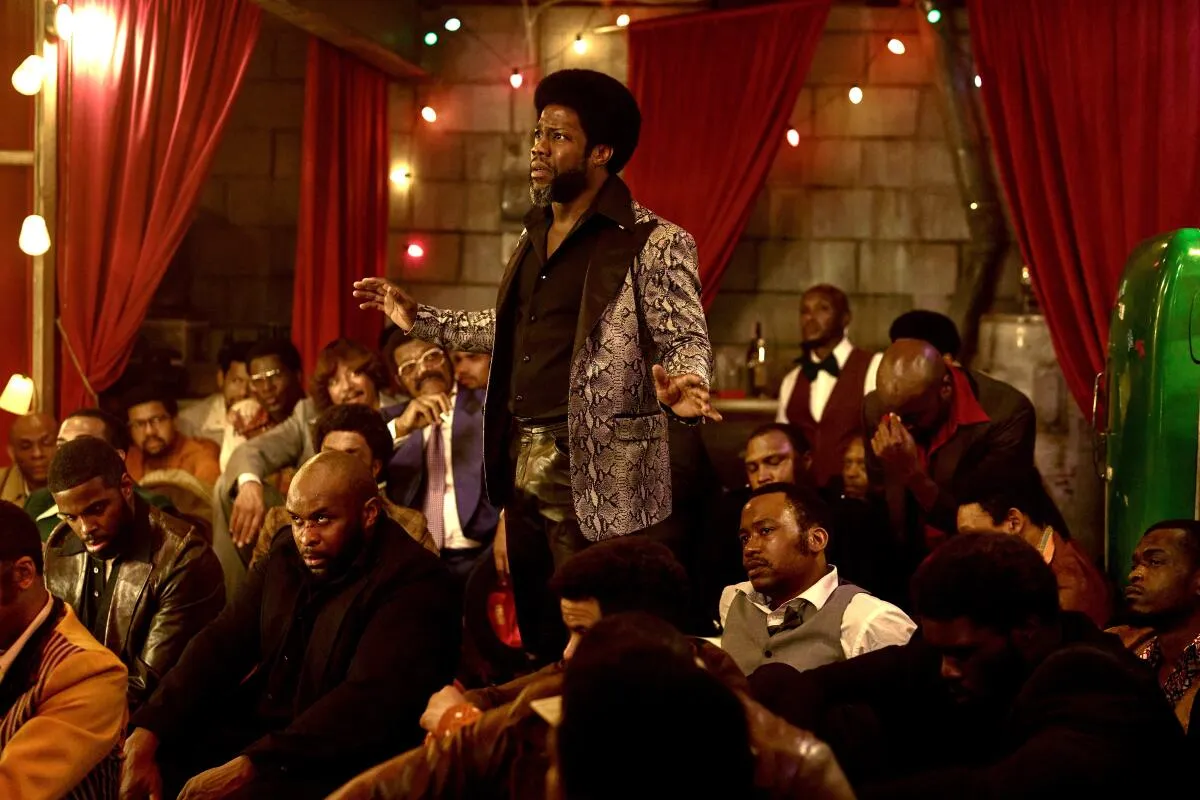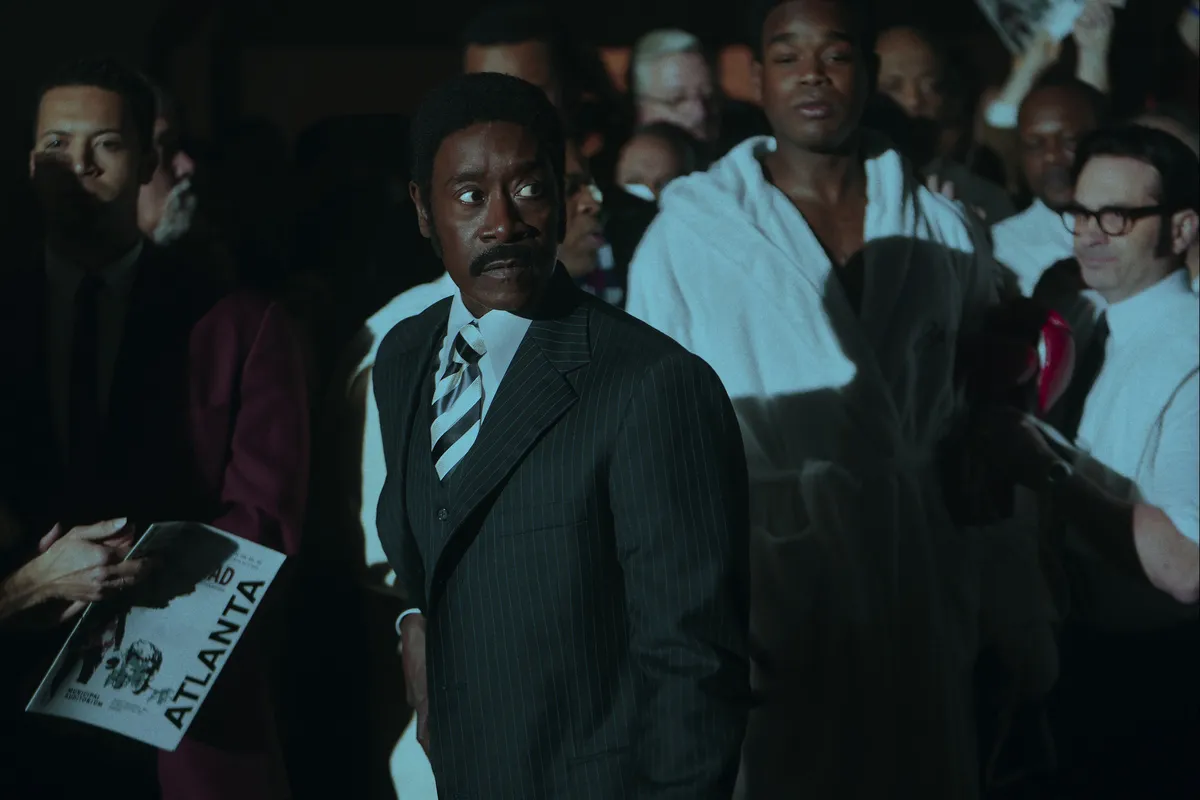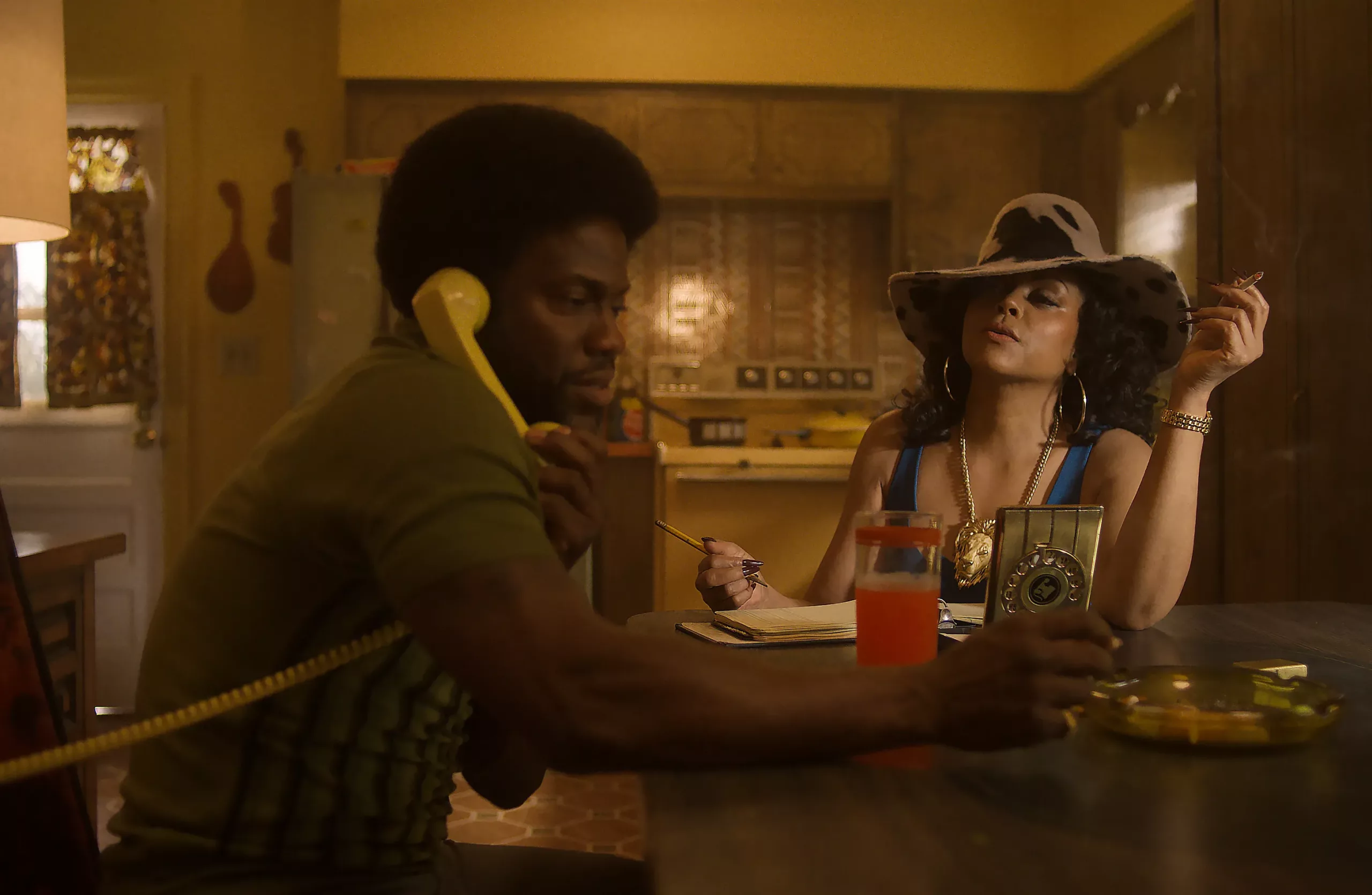The events of October 26th, 1970, in Atlanta, Georgia, provided the spark for an unforgettable limited series. On that night, boxing legend Muhammad Ali made his long-awaited return to the ring at the Atlanta Municipal Auditorium. Though Ali was victorious over Jerry Quarry, the real excitement was unfolding elsewhere in the city.
A lavish afterparty held in Atlanta’s West End would go down in history, though not for the reasons anyone expected. When armed robbers burst into the gathering, over a million dollars’ worth of valuables were stolen from high-profile guests. This brazen heist formed the basis for Peacock’s 2022 crime drama miniseries Fight Night: The Million Dollar Heist.
Adapted from the iHeartMedia podcast of the same name, Fight Night brought this outlandish true story to life through eight gripping episodes. An all-star cast tells the tale, with Kevin Hart leading as street hustler Gordon “Chicken Man” Williams. Don Cheadle and Dexter Darden also shine as detectives J.D. Hudson and Muhammad Ali.
Directors like Craig Brewer lend their talents to recreate the look and atmosphere of 1970s Atlanta. While taking dramatic liberties, Fight Night manages to explore the cultural context of the time through this one criminal event. For those who enjoy true crime mysteries blended with social commentary, this limited series proves an immersive viewing experience well worth your time.
The City and the Scene
Atlanta, Georgia, in 1970 was a city undergoing many changes. Decades of segregationist laws were finally being overturned, yet racial tensions remained high. Against this backdrop, one event stopped the city and the nation: Muhammad Ali’s controversial comeback fight. Held at the Atlanta Municipal Auditorium on October 26th, the bout marked Ali’s first time in the ring after three years away while banned from boxing.
While Ali emerged victorious over Jerry Quarry that night, the real spectacle unfolded elsewhere. Gordon “Chicken Man” Williams, a locally renowned numbers runner, decided to throw an opulent afterparty in west Atlanta. Williams was a hustler with big ambitions, hoping the event might raise his profile. Unbeknownst to guests like reputed crime lord Frank Moten, others had different plans that evening, which would shock the city.
This saga of the real-life “Million Dollar Heist” partly inspired the iHeartMedia podcast of the same name. The limited series adapts the podcast while taking some creative liberties. We’re introduced to semi-fictionalized versions of key figures based on their true-life counterparts. Chicken Man, played by Kevin Hart, remains the hopeful host whose party goes awry. Samuel L. Jackson stars as Moten, alias the “Black Godfather.” Don Cheadle takes on the role of Atlanta’s first black detective, J.D. Hudson, tasked with uncovering the truth.
By recreating the fashions, music, and culture of 1970s Atlanta through events of that fated night, the series uses a single criminal event to explore the city’s transition out of segregation as well as the controversial Ali’s role as an icon battling national scorn. Against this backdrop, the mystery of what truly transpired unfolds over eight fascinating episodes.
Weaving a Mystery
Fight Night: The Million Dollar Heist unspools its true crime tale over the course of eight gripping episodes. The opening episode kicks off on the night of October 26th, 1970, as Muhammad Ali returns to the ring in Atlanta. We’re also introduced to street hustler Gordon “Chicken Man” Williams, whose lavish post-fight party becomes the center of the story.
Episodes one to three focus on Ali’s triumphant comeback victory and the beginnings of Chicken Man’s ill-fated gathering. It’s here that the disastrous robbery goes down as masked men storm the party. Chaos erupts as guests are stripped and robbed of their valuables worth $1 million total.
With the heist in full swing, the next episode jumps ahead to investigate the aftermath. Detective J.D. Hudson steps in to lead the case. He starts to assemble clues by interviewing traumatized witnesses, including Ali himself, before the champion exits the series. Meanwhile, Chicken Man finds himself wrongly accused as the prime suspect in the media.
Over the middle chapters, the investigation progresses amid rising tensions. Hudson deals with racism on the force while probing all leads. Chicken Man struggles to clear his name, with criminals now targeting him. Flashbacks offer glimpses of the robbers whose lives are now at risk. Twists emerge as more players are implicated in the complex heist scheme.
By weaving fictional drama around the true crime framework, Fight Night succeeds in keeping its multi-threaded narrative compelling all the way to the tightly-wound series conclusion.
True Colors
Under flashy exteriors, the characters of Fight Night reveal hidden depths. Primary among these is Kevin Hart’s soulful turn as Chicken Man. Buried under husky vocals and graying stubble lies a vulnerable entrepreneur chasing respect. Hart navigates these shades with nuance rarely seen before.
As Denver J.D. Hudson, Don Cheadle brings formidable presence. Facing racism on both sides of the law, Hudson stands stoic for justice. Cheadle mines profound empathy from every knowing glance.
Inheriting real-life figures adds intrigue to familiar faces. Samuel L. Jackson roars as crime lord Frank Moten, a silk-gloved menace recalling Pulp Fiction’s Jules. Likewise, Terrence Howard spins a Cadillac Wheeler into an ever-more-captivating conundrum.
Stepping into Muhammad Ali’s celebrated shadow came daunting for Dexter Darden. Though lacking the champ’s physicality, Darden’s meditative scenes share Ali’s intellectual gravitas. Their rapport shifts Hudson from adversarial to admiring.
Notable too is Taraji P. Henson’s fiery Vivian, refusing objectification even in misogynistic scenes. Support from Artrece Johnson as Chicken Man’s wife lends poignancy, while characters sketched less fully still engage.
Through star power and layered character work, Fight Night elevates its true crime tale. Performances prove the series’ secret weapon, rewarding focus on individuals within Atlanta’s seismic change.
Capturing an Era
Fight Night immerses viewers in 1970s Atlanta through artful direction and design. Craig Brewer brings his expertise, guiding multiple episodes. Under his eye, costumes and sets overflow with bell-bottomed swagger and Afro picks.
Split screens split scenes into vivid halves, zooming snapshots capturing the city from all angles. These techniques borrow from blaxploitation films while feeling fresh. Combined with gritty credits over battered film stock, Brewer taps grindhouse spirit.
Yet much of the series was helmed by other hands. Consistency wavers where Brewer isn’t involved, location work losing some defining period touches. Fight Night comes alive most in its directors’ tighter control, balancing style and substance.
Throughout, soul tunes serenade each scene, transporting straight to Motown’s heyday. Between streetside dollar rackets and afterhours clubs, authenticity reigns. Closing images remind us that beyond fiction, real lives inspired these stories, successes and struggles alike shaping Atlanta’s rise.
While direction varies, consistent production maintains the illusion. Costumes and music envelop scenes in a 70s atmosphere, so viewers live alongside characters, sharing their world, if not their dangers. Fight Night makes the most of its setting to enrich complex issues with living history.
Twists in the Story and in History
Fight Night weaves complex themes within its true crime yarn. Embedded commentary explores Atlanta’s transition from segregation through one catalytic night. Layered characters represent those shaping change from both sides of the law.
Intersecting tones create an unsteady but compelling mosaic. Comedic scenes share space with hard drama and violence, varying impact. Pacing lags, stretching over eight hours, yet character development engages.
Central figures emerge fully formed, though minor roles lack depth. Contextualization replenishes understanding for some but muddies suspense. Flashes of history enlighten while derailing from fact strain credulity.
Still, fictionalizing real events progresses discussion of race relations and a city’s rebirth. Major players personify progress and resistance amid turmoil. Minor characters personify a wider society navigating new norms. Together they represent turbulent currents that rippled far beyond one heist.
Balancing imagination with the true stories inspiring it, Fight Night locates profundity in people. If erring by embellishing details, its spirited weaving continually surfaces thought-provoking threads from America’s rich tapestry of troubles and triumphs.
Beyond the Heist
Fight Night weaves an absorbing story, though not without flaws. Stretching one exciting night over many hours proves tiresome, diluting tension. Yet director Brewer tightens the reins with flare, keeping true to the gritty 1970s aesthetic.
While inconsistent in places, makers compensate with a powerhouse cast who bring this true tale to vivid life. Kevin Hart, Don Cheadle, and Samuel L. Jackson lead an ensemble who elevate material with commanding presence. Their complex characters drift beyond simple genre archetypes into something richer.
As both a crime procedural and commentary, Fight Night finds profundity examining Atlanta’s transformation through this seminal criminal event. Had makers tightened focus to a feature, narrative cohesion may have strengthened where it frayed as a series.
Still, anyone who admires nuanced acting or recent American history will find much to engage with. And those seeking a story with more on its mind than thrills alone may come to see its social insight enhances entertainment value.
Though not flawless, Fight Night merits attention for efforts balancing fact and fiction to explore weightier issues. And for celebrations of a city and actors’ craft that linger beyond the final scene’s end. For balanced viewers, this adapted true tale proves well worth unmasking.
The Review
Fight Night: The Million Dollar Heist
Fight Night: The Million Dollar Heist tells a true crime story that transcends the genre through its exploration of history and focus on richly developed characters. Though inconsistent at times due to an overloaded narrative, the miniseries engages through its strong ensemble acting and examination of pivotal social themes. While not wholly seamless, Craig Brewer's direction and the cast's performances make Fight Night a memorable limited series overall.
PROS
- Powerful performances from an all-star cast including Kevin Hart, Don Cheadle, and Samuel L. Jackson
- Authentic 1970s setting effectively portrayed
- Engages with important issues of race relations and Atlanta's history
- Adapted true crime story incorporates real-inspired figures.
CONS
- Narrative loses focus stretching over too many episodes.
- Tonal inconsistencies between drama, action, and comedy
- Not all minor characters are fully developed.
- Plot deviates too far from factual basis at conclusion






















































Discussion about this post